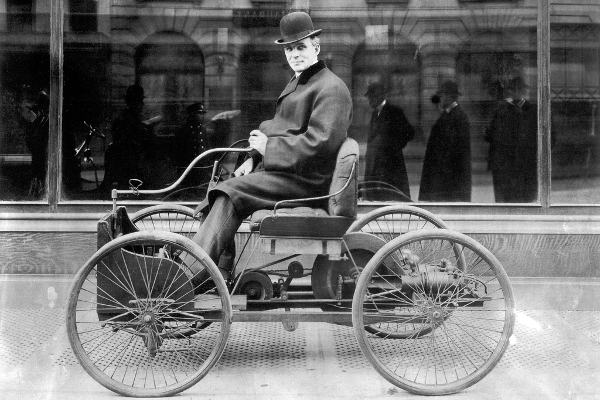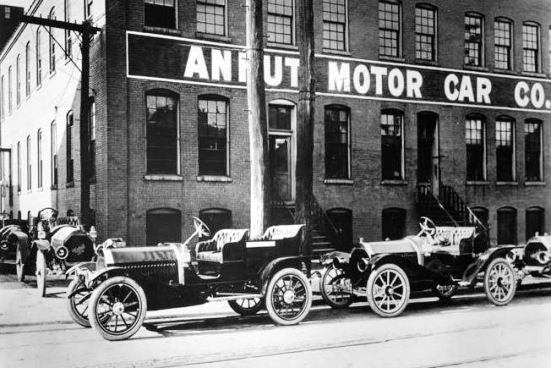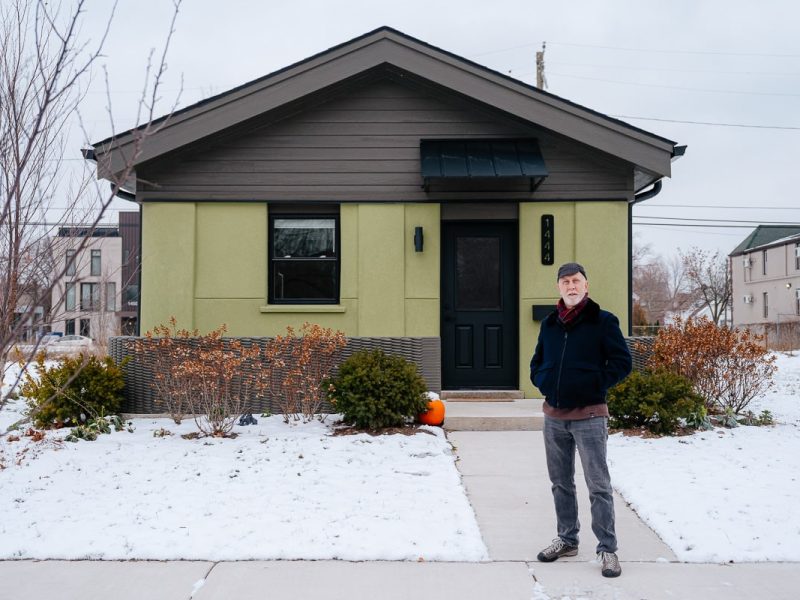Can Detroit re-revolutionize the auto industry, or is Elon Musk beating us to it?
You'd think it was 1893 all over again, when a veritable 'mobility startup scene' was heating up all over the country. But is Detroit missing out on the action this time?

You’d think it was 1893 all over again. Back then, a veritable ‘mobility startup scene’ was heating up all over the country.
Multi-modal transportation was all the rage among the “urbanists” (namely everyone). Inventors were experimenting with new technologies and making big headlines. Confused and fearing for their safety, a lobby of bicyclists petitioned the federal government to create new regulations under an office which would later be known as the FHA (Federal Highway Administration), and entrenched incumbents were scrambling to figure out what to do about this whole “self-conveying vehicle” fad (i.e. the car).
About 15 years earlier, the mass-appeal of the bicycle lead many to wonder about a “self-conveying” bicycle. Startups began forming all around the country with the first proof of concept rolling through Des Moines, Iowa in 1893. Yes, Iowa.
Chatter was growing about a new technology that would completely revolutionize how people and commerce move, and a variety of conditions created a fertile ground for these “self-conveying” vehicles to be manufactured here in Detroit.
Tracking all of this was an electrical engineer named Henry Ford. While working his day job, Ford experimented. One evening, he got the chance to share some of his ideas with his boss over dinner. Fortunately for him, his boss was a brilliant entrepreneur and inventor named Thomas Edison. Impressed by Ford’s ideas that night, Edison encouraged him to continue aggressively developing them. After building his second concept vehicle, he secured startup capital from a local Venture Capitalist, quit his day job, and founded the Detroit Automobile Company in 1899.
It failed six months later.
Then he started the Henry Ford Company…and left a year later.
Finally, in 1902, he co-founded his third company with racing cyclist Tom Cooper and an angel investment from Alexander Malcomson, a local energy dealer. The rest is history.

At the time my great grandpa, John Nicholson Anhut, was a 25-year-old hustler and the youngest state senator ever elected in Michigan. Surely following the headlines about the booming startup scene in Detroit while drinking plenty of old fashioned’s at the Sugar House of his day, Anhut recruited the Mayor of Detroit to start one of these “self-conveying” vehicle companies with the brazen confidence only a 25-year-old state senator can possess.
Thus was born the Anhut Motor Car Co., which was headquartered at 510 Howard St. (today a blockaded area patrolled by Homeland Security that feels like the demilitarized zone). After producing the Anhut Six but failing to gain market traction, Anhut Motor Car went bankrupt like the Detroit Automobile Company before it.

Unfortunately for my family, my great grandfather gave up on the auto industry (he would go on to bribe judge in New York with the hope of securing the release of a mentally insane millionaire who had murdered his wife’s prominent architect lover, but that’s another story all together). Meanwhile, Henry Ford stayed focused on building the Model T, designing the modern assembly line, and giving rise to the American middle class.
I tell this story because we’ve forgotten it.
Two weeks ago, in the midst of the North American International Auto Show in downtown Detroit, I attended the Automotive News World Congress and was fortunate enough to hear the Henry Ford of our time, Elon Musk, speak for over an hour about his company, the auto industry, and his predictions for the future.
You’d think that revolutionizing the financial industry, resuscitating the space industry, and now reinventing the automotive industry would buy Musk some respect in Detroit. It did not. The mostly white, 55-and-up, male attendees balked at his claims and maintained skepticism about his plans. A secretive, competitive, and mature industry has no idea what to do with a South African geek genius.
The question sitting in our laps, parked outside, and crumbling next door is this: do we, as an industry, want to change? Because if we don’t change, we’ll look back and think about bankruptcy as the good times.
This past year has seen the broader culture just beginning to catch on to the abundant opportunities present in mobility. This time, however, the opportunity is far greater than it was in 1893 because of some incredible global megatrends. If you told Henry Ford that he could sell his Model T to the entire globe, sell movies and newspapers directly to consumers in their vehicle, and have the vehicle drive itself, all while creating a subscription model of recurring revenue, he’d spit out his non-alcoholic beverage, tweet out a provocative prediction, and mortgage all of Dearborn to own this future business.
This is exactly what Elon Musk has done and is doing.
Will Elon Musk ‘out-Henry-Ford’ Ford Motor Company? In his most prominent speech yet, Mark Fields, the new CEO of Ford, gave a CES keynote boldly rebuking most of those fears. Proclaiming that Ford Motor Company is now a mobility company and focused on conducting ‘Smart Experiments’ around the world, he posited about the potential all of these concepts have in the future.
Are these smart mobility experiments going to turn into real, serious investments, though? Again, Musk thinks so. The modern-day Henry Ford just double-downed on his electric car company’s future by building his Gigafactory, which some have already valued at $50,000,000,000.
For all you bears out there who laugh at this self-driving nonsense and think that Elon’s arrogance will cause him to fall flat on his face, know this:
Uber’s Valuation ($40B+ of which Google is significantly invested) + Tesla’s Market Cap ($26B) > Ford’s Market Cap ($57B)
Sergio Marchioone, CEO of FCA (Chrysler) recently shared this omen:
“I can smell capital pilferage. I can smell the abuse of capital structure. I’ve seen excessive things being done for the sake of ego satisfaction, for the sake of unfettered pride. This is nonsense. I love the product, but we’re going to have to go straight here. I think the drinking binge is over.”
A tsunami of change is tumbling towards us, and hopefully, the Motor City will not only ride this wave, but actually drive it into the future (even if it’s just a video game.)
—
Kevin Krease is Model D’s automotive correspondent. Follow him on Twitter @kevinkrease.




